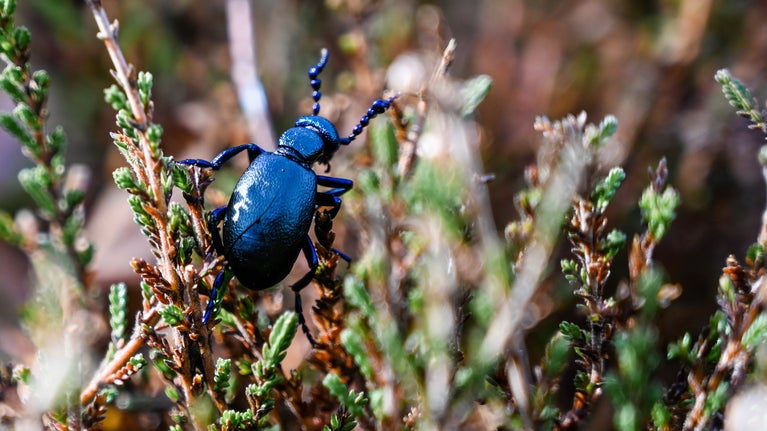
Discover more at Kinver Edge and the Rock Houses
Find out when Kinver Edge and the Rock Houses are open, how to get here, things to see and do and more.

The fragile heathland habitat at Kinver Edge is home to many rare species, as well as more familiar plants and animals. Much of the landscape is a designated Site of Special Scientific Interest for its ecological importance. Here are some of the plants and animals you might see on your visit.
Look out for migrant birds such as redwings and fieldfares, arriving from Scandinavia to feed on holly and rowan berries in the woodland.
At this time of year, Kinver’s resident woodland birds join up into flocks of mixed species. They spend winter moving around the woods together feeding. You might spot close to 10 species including treecreepers, chaffinches and greater spotted woodpeckers.
Four types of reptiles live on the heath: common lizards, slow-worms, adders and grass snakes. They can often be spotted basking in the sand, and if very lucky you may catch a fleeting glimpse of adder with their distinctive zig-zag pattern.
The human residents may have moved out, but the rock houses are not uninhabited. Rare lesser horseshoe bats have a winter roost here, their furthest north in the country. Listen for them on the bat detectors at the rock houses reception between October and April.
Natterers and brown long-eared bats are amongst those that live in the woods.
Spring brings the sound of many breeding birds to the heathland and woodland, such as the evocative call of cuckoo, unusual rodding of woodcock, melodic song of willow warbler and striking song of skylark.
Red kites can be seen in summer and ravens later in the year. Heathland restoration work will hopefully one day bring back the churring of nightjars to the heath, and encourage species such as woodlark to make Kinver Edge their home.
Visit on a warm day or a balmy evening and the buzz of insects brings home how full of life this heathland habitat is. Over 700 species of moths have been recorded on Kinver Edge, including angle striped sallow, its only Staffordshire site. Visit in the summer for moth-trapping events to see these night-time fliers.
The summer days bring a host of butterflies, such as white admiral in the woodland and brown argus on the heathland and grassland. Nearly a hundred species of solitary bees and wasps can be found nesting in the sandy ground; you might even see their holes below your feet.

The varied plant life brings colour and interest year-round. Bright yellow gorse fills the air with a tropical aroma in spring, then a wash of purple takes over when the heather blooms in September.
You can find plentiful bilberry and heath bedstraw, and might spot the surprising grey hairgrass, a species usually found on sand dune systems on the Norfolk and Suffolk coast.
Fungi brings colour to the forest floor in autumn, including greasy tough shank, scurfy twiglet and blue leg brownie to name a few.

Find out when Kinver Edge and the Rock Houses are open, how to get here, things to see and do and more.

Kinver Edge is home to both the Kinver Hillfort and the Kinver Rock Houses. Find out more about the history of this unique area in the West Midlands.

Kinver Edge is a two pawprint rated place. It's a great place to come and exercise with your dog, with miles of footpaths and open countryside for you to explore.

The Rock House café serves everything from light bites to sandwiches and soup, all in a unique setting. Inside you’ll also find second-hand books for sale.

Discover the learning opportunities at Kinver Edge and the Rock Houses, and get in touch about bringing your group.

From looking after rare lowland heath to managing woodland for butterflies, discover some of the important work the ranger teams at Kinver Edge do.

Find out about volunteering at Kinver Edge and the Rock Houses, and the current opportunities available.